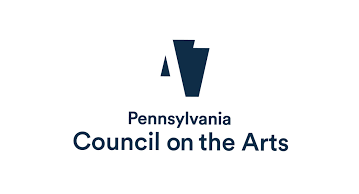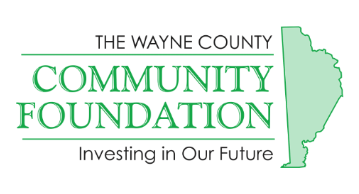In His Own Words
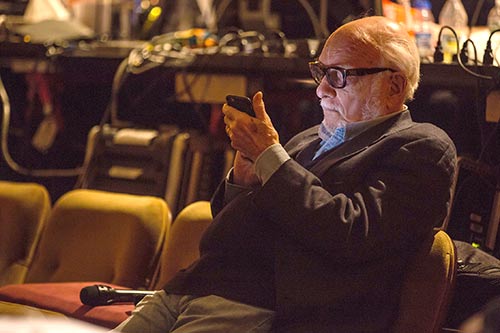
Howard Sherman speaks with The Prince of Broadway Himself, Hal Prince
It is impossible to overstate how important Harold S. Prince was to musical theatre in the latter half of the 20th century. As a producer, his credits include The Pajama Game, Damn Yankees, West Side Story and Fiddler on the Roof. As a director, he is known for a series of collaborations with Stephen Sondheim – including Follies, Company, A Little Night Music, Pacific Overtures, and Sweeney Todd – as well as musicals ranging from She Loves Me to The Phantom of the Opera to Kiss of the Spider Woman. August saw his newest show, Prince of Broadway, a retrospective that samples material from shows he either produced or directed (or both), debut at Manhattan Theatre Club. September began with the publication of Sense of Occasion (Applause Books), a theatrical autobiography that incorporates and annotates his 1974 book Contradictions, in addition to adding new chapters that cover his career to date. He spoke with Stage Directions about these career spanning projects just one week after the opening of Prince of Broadway.
[Ed. Note-The interview has been edited for clarity and condensed for space.]
Howard Sherman: In Contradictions, you said that you never thought a show would have a longer run than Fiddler on the Roof. In the annotated version in Sense of Occasion, you
note that many shows have run longer and that you were wrong. Do you
think it’s good for Broadway for musicals to run as long as they seem to
now? They seem to be engineered for longer runs.
Hal Prince: Well,
I don’t think you can engineer. I don’t think that’s what’s happened. I
think what’s happened is Broadway musical theater has become
international. What has happened is the shows that are running and
running and running do not require your understanding of language. So
everybody in the world comes to see them because they have a
relationship either to the original material, the book or the movie or
whatever, and because they know the story and they’re happy.
We took Prince of Broadway to Tokyo, where no one speaks English. They all adored every moment of it because they had a relationship with most of those shows. I don’t think anything is being engineered. I think what’s happening is our public is vastly enlarged.
My Fair Lady ran five years. Now, I’m not disparaging it, I’m very happy to contemplate 30 years of Phantom of the Opera, but it’s amazing. It has nothing to do with the theater that I started in. However, it certainly has international implications, which most theater did not have when I started. You know, what you did was a musical on Broadway and you went to London and did it in London. Then suddenly Germany entered the picture, and then Vienna, Austria, and now Tokyo. In other words it’s just a whole other mindset regarding musical theater.
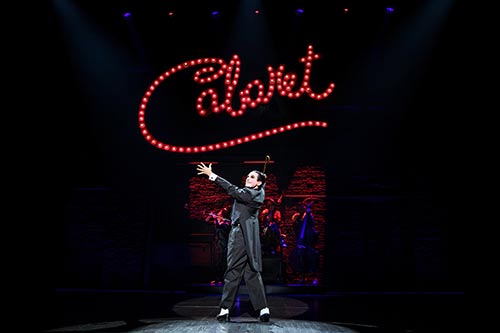
Oh, because of the cost of everything. Very simple. If you could do Flora the Red Menace, lose the complete investment, and the next year do Cabaret, that was how careers happened. Sondheim’s, Bock and Harnick’s, Kander and Ebb’s – you didn’t have to have a hit the first time out. There was a second time, because you were about a $250,000 investment. The biggest laugh in Prince of Broadway is when I say the most expensive musical ever done at that time was Follies – $800,000.
That’s what has changed everything. Of course you couldn’t do Follies today. You can do revivals of Follies but you can’t do a sumptuous revival of Follies equal to the sumptuous production we did, unless the current one in London is sumptuous, which may be true because it’s the National Theater.
You had the opportunity with Prince of Broadway to go back
and look at pieces of your shows from the past. Did that prompt any
thoughts on your part about if you were to go back and redo any of those
shows, would you do them differently, and if so, which ones?
I
don’t much think back, I don’t live in the past very much. The only
thing that I touch on in the book that is very real, is every once in a
while, and there are incidents of such across the length of my career, I
think I’m bending a project to say what I want it to say, and I’m not.
In other words, Grind is a very good example. I talk about
wanting to do a musical about violence. Well that was not the right
material to do that about. You know, that’s me fooling myself, which is
something that happens occasionally. You don’t always learn the lessons
that you should learn, and one of them of course was wishful thinking,
that certain things meant something that they didn’t mean, and that you
could bend them to mean. That’s something I found out a long time ago,
but it’s not necessarily a lesson that I learned. It got repeated,
again, with a few shows. Grind is the most obvious choice.
Do you still read new scripts and look for new projects?
I’m
looking right now. I know I want to get to work on something. There are
three projects right now, interestingly enough, that all have converged
here and I want to pick one and go to work, but I’m not going to for
another few weeks. I really, I want to be a little cautious.
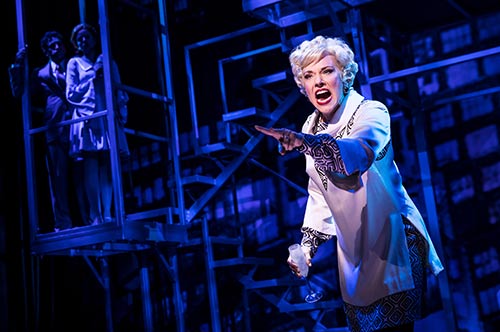
Well not only do you make your own luck, you also have to recognize luck when it comes. In other words there are all various ways of both attracting and recognizing luck. Even bad luck. When I went into the army that was, I thought, the worst thing that could ever happen to my career. It turned out to be the best thing. Not only did it nurture Cabaret, but it also calmed me down. I wasn’t getting my own way all the time. I graduated college a little before the age of 20, was too goddamn young to graduate from college, and that sets you up in a very weird place socially. It’s uneven, your development. All my ambition was abrasive, and then when I came back, after two years of the army, I wasn’t that anymore.
Is there a moment in your career that you can point to where you did make your luck?
Oh
sure. That story in the book, I think it’s in the book, where I wrote a
script for a television series that [George] Abbott had signed on to
produce and direct. Over a weekend having read the script that other
writers had sent him, established playwrights, and knowing that he
wouldn’t like it on Monday morning when he was supposed to go into a
table reading, I wrote a script of my own. I heard him bellow in his
office, “Oh God, now I have to write a script,” and I walked in and I
said, “Mr. Abbott, actually I read that script on Friday after you’d
left the office, and I figured you wouldn’t be happy, so I wrote one of
my own. Would you like to read it?” He read it and said, “Yeah, it’s
terrific. You direct it.” That’s making your luck.
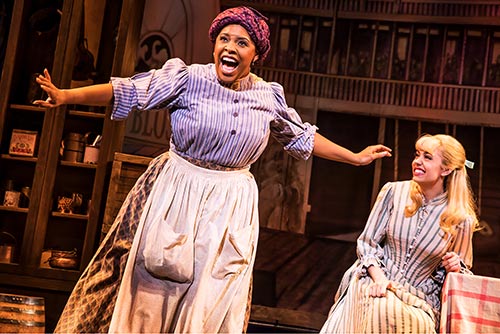
On Prince of Broadway, we were really working mostly on picking the material. But I knew something was missing, and only about eight weeks ago, 10 weeks ago, did I come up with what was missing – it’s the opening of the show, and that’s very important. Which now is a fellow coming on, the footsteps, the looking at the empty stage, and then looking at the empty audience and the sound effect, and all of that. That unlocked my sense of I know what I’m doing, I’m filling an empty space. Over and over and over again, with something.
One of the things that has certainly changed since you began
producing is theater technology, and I’m wondering whether the evolution
in technology has facilitated realizing the work you want to do?
It’s
a complex answer. Do I have much respect or interest in LED lights and
projections? No, I do not. I like the theater for the relationship it
has with a live audience and its inducing a kind of imagination that I
think only the theater can create. A compact with the audience. Film and
television, you can’t affect what’s living on the stage in front of
you, but you can in the theater.
I think it took the enormous skill of Beowulf Boritt to put all those shows on that stage [in Prince of Broadway], which is not the biggest stage in the world. It’s amazing. He’s given a lot of credit to the original designers, because I asked him to please be strongly influenced by them, but just getting all that in that theater is a work of great creativity. I’m not sure it could have been done a number of years ago. However, I do like the theater to find its solutions theatrically, not with high-technology. It doesn’t speak to me in the theater at all.
Another thing that’s changed is the rise of ever more training
programs. Is there a difference in the talent base that you see when you
hold an audition now, versus what it might have been in the past?
Oh well sure. I mean, let’s face it, when I started in the theater you were a chorus singer, or a chorus dancer, or a principal, or a star. The principals and the stars usually were not as good at singing as the chorus singers, or as good at dancing as the chorus dancers. They were uniquely stars, or potential stars. That is not true anymore. You know, people like Gertrude Lawrence were enormously glamorous, seductive creatures and very exciting on the stage. Now, everybody can do everything, and that’s what Prince of Broadway illustrates, there are only nine people doing that show. They’re doing material from 16 musicals.
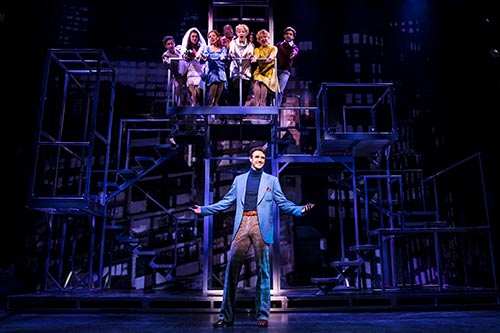
It’s quite extraordinary how much you get in.
That’s because they are so skillful. Someone like Bryonha [Marie Parham] to do Showboat and Sally Bowles and Amalia’s “Will He Like Me?”, that’s an extraordinary accomplishment. I’m not sure that 30 or 40 years ago anyone could have done those three roles in one show.
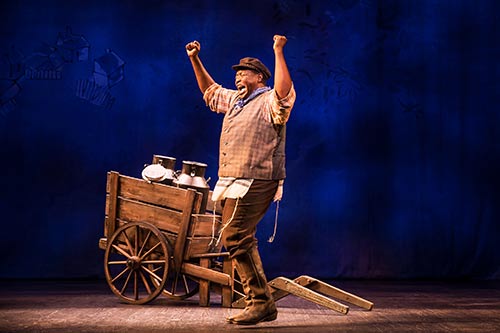
What also changed is that 30 or 40 years ago people would not have imagined Bryonha in She Loves Me.
No.
Of course not, or you wouldn’t see Chuck [Cooper] singing, “If I Were a
Rich Man”. Oh boy, is that a huge sea change in what seems like a
relatively short time. I remember when I produced Fiddler on the Roof,
Equity came to me and said, “Why do you not have any black people in
your cast?” I said, “Well because they didn’t exist in the shtetl. I
called Jerry [Bock] and I told him that they were inquiring and Jerry
said, “No, I won’t, we won’t have that. I can’t have that. It’s not
real.”
Well, we have gone such a distance in, it depends on what one thinks is a short time or a long time, but certainly we have come that distance in my lifetime. Which is quite a long lifetime. If you saw A Doll’s House, Part Two, and if you see the casting there, it’s a real eye-opener. But we’ve done that too in Prince of Broadway. It’s completely easy for the audience to assimilate it. That would not have been so 40 to 50 years ago.
How much do you keep tabs on Phantom at this point in time?
I’m
very close to it. After all, I live in New York, and when I used to be a
producer, it frustrated the hell out of me that I could never get
George Abbott and Jerome Robbins back to see their shows. When I became a
successful director, I knew there was an obligation to keep the show in
mint condition.
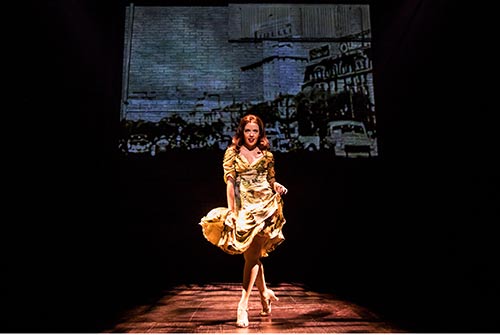
Given these reminders of your extraordinary career, and where you
are in your life, you certainly could just relax at this point. What
drives you to keep making theater?
I love the work. I love the
activity, I love the theater, I love actors. Not all directors love
actors, you know. I do. I love the process with the writers, and
designers, and then I love rehearsal. I never am happier than I am in
rehearsal. I used to say, despite the fact that I adore my family, and
I’m very grateful for them and their support and the fact of family, I
still love to work. As much as I ever did.
Which is why I did not want anybody to mistake Prince of Broadway as my valedictory. My wife said to me, “I hope when Prince of Broadway opens you know exactly what you’re going to do next year.” I said, “Well I don’t think I’m going to make that date, but I’ll make it fairly soon, and I think I will within the next month or so.”
Your mentor George Abbott directed his last Broadway show at over the age of 100. Do you want to beat him?
Oh,
I’m not in competition with him. You know what? People are living
longer. George was a phenomenon. He lived to 107. I’m going to be 90. I
feel around 45. For as long as that is maintained I’ll keep working.
Ultimately I suppose I’m going to slow down, but I have no impulse to
slow down at this point because I don’t need to.
All photos from Prince of Broadway credited to Matthew Murphy ©2017
Backstage Pass
Wicked’s John Dossett and Michele Pawk on Life in the Theater, and Life Beyond It
John Dossett and Michele Pawk don’t wear their resumes on their…
Performances Announced for 2023 Tony Awards
Initial performances have been announced for the main telecast of the…
Big 10 2022: The 10 Most Represented Colleges on Broadway
Find out which colleges and universities had the most alumni…
Tickets
Box Office
Tickets for performances at Honesdale High School Performing Arts…
Plan Your Visit
Planning a visit to Honesdale High School Performing Arts Center? Need…
Purchase Tickets
OnStage at Honesdale Performing Arts Center
Seating
Persons will not be permitted inside the Honesdale High School…
Student Rush Tickets
Wayne Highlands School District students can order $5 rush tickets for…
Ticket Sales Policy
Tickets for performances at Honesdale High School Performing Arts…
OnStage 2025-2026
Annie Jr
Wayne Highlands Middle School proudly presents Annie Jr November 21-22, 2025
School of Rock
Honedale High School proudly presents School of Rock February 13-15, 2026
Chicago in Scranton
CHICAGO - The Musical Saturday, March 7, 2026
U.S. Navy Sea Chanters
The U.S. Navy Sea Chanters March 14, 2026

